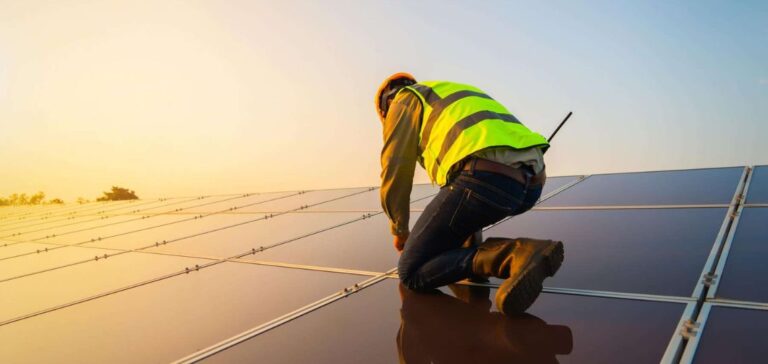Renewable energies are playing a major role in the job market. According to the International Renewable Energy Agency IRENA, the sector has just reached 11.5 million jobs, up from 11 million in 2018.
“Beyond climate targets, governments are prioritizing renewable energies as a driver of low-carbon economic growth, in recognition of the many job opportunities created by the green transition. Clean energies enable all the main pillars of sustainable development – environmental, economic and social – to be achieved. As the global energy transformation gathers pace, this employment dimension reinforces the social aspect of sustainable development and provides yet another reason for countries to embark on this transition.”
Renewable energies dominated by solar power
The photovoltaic sector employs 3.8 million people, 2.2 million of whom are in China. According to a study by IRENA, the wind energy sector employs 1.2 million people, 44% of whom are located in China. In particular, the development of offshore technology has advanced the development of this technology. The hydropower industry has also made its mark on the global economy, employing 2 million people according to IRENA Director General Francesco La Camer.
“The adoption of renewable energy creates jobs and increases local revenues in both developed and developing energy markets.” If we see a handful of countries leading the way today, every country can harness its renewable potential, take steps to capitalize on local industrial development capabilities and train its workers”.
Renewable energies and the development of the biofuels sector
The 2.5 million jobs in this sector are concentrated mainly around the agricultural supply chain. According to IRENA, 90% of workers are concentrated in countries with a high labor capacity. This is the case in Brazil, Colombia, Malaysia, the Philippines and Thailand.
“The regional profile of employment in the biofuels sector differs considerably from that of the solar PV sector. Labor-intensive feedstock supply lines mean that Latin America accounts for 43% of all biofuel jobs worldwide, and Asia (mainly Southeast Asia) for 34%. The more mechanized agricultural sectors of North America and Europe translate into lower employment shares of 13% and 10% respectively.”
Asia as a leader in renewable energies
In 2019, this continent will account for 63% of jobs in renewable energies. China alone accounts for 38% of the global total, or nearly 4.4 million jobs. Whereas this area of production used to be concentrated in a handful of major markets, such as China, the United States and the European Union, it is now gradually spreading to countries in East and South Asia.
More inclusive jobs
According to IRENA, renewable energy jobs are more inclusive and have better gender parity than those in the fossil fuel sector. Women account for 32% of jobs in the renewable energies sector, compared with 21% in the fossil fuels sector.
However, this does not reflect the proportions of scientific and technological positions held by women compared to administrative roles. What’s more, the wind industry is lagging behind other sectors in this area.
An education policy geared to retraining
According to Irena’s Managing Director, Francesco La Camera, one of the solutions to the ecological transition is to retrain workers in the fossil fuel sector. This involves educational measures and training. A UK survey of oil and gas workers shows that they are looking to leave this declining sector for renewable energy.
“Policymakers must also prioritize the retraining of fossil fuel workers who have lost or are at risk of losing their livelihoods. Many of them have considerable skills and expertise to contribute to a reoriented clean energy industry.”
A post-covid recovery program for renewable energies
According to IRENA, even if the development of renewable energies was halted by the coronavirus pandemic, the impact was smaller than for fossil fuels. However, the creation of a post-covid stimulus program could create up to 5.5 million additional jobs over the next three years. The Global Renewables Outlook forecasts the creation of 42 million jobs in renewable energies by 2050.
“Never has the importance of such an impulse been clearer than at this crucial moment. Even as the world continues to grapple with the COVID-19 pandemic, humanity is receiving almost daily reminders of what lies ahead if we fail to address the climate disruptions that are building up.”





















